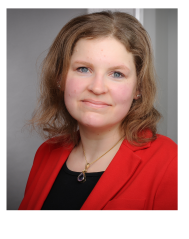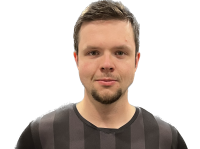Prof. Almut Heinken
 Almut Heinken is a Junior Professor at the NGERE Inserm 1256 unit and the University of Lorraine, Nancy, France. She previously completed her PhD in systems biology at the University of Iceland, and a post-doc at the Luxembourg Centre for Systems Biomedicine. Afterwards, she worked as a Research Fellow at the National University of Ireland Galway. Her area of expertise lies in multiscale metabolic modelling of host-microbiome interactions and their role in human health. She has contributed to the development of a resource of genome-scale reconstructions of human microbes, AGORA, and led the development of its successor, AGORA2. She has also developed tools to build personalized microbiome models from AGORA that allow the stratification of patients and controls. She is currently working on modeling the interactions between diet, the microbiome, and the epigenome in early-life metabolic programming.
Almut Heinken is a Junior Professor at the NGERE Inserm 1256 unit and the University of Lorraine, Nancy, France. She previously completed her PhD in systems biology at the University of Iceland, and a post-doc at the Luxembourg Centre for Systems Biomedicine. Afterwards, she worked as a Research Fellow at the National University of Ireland Galway. Her area of expertise lies in multiscale metabolic modelling of host-microbiome interactions and their role in human health. She has contributed to the development of a resource of genome-scale reconstructions of human microbes, AGORA, and led the development of its successor, AGORA2. She has also developed tools to build personalized microbiome models from AGORA that allow the stratification of patients and controls. She is currently working on modeling the interactions between diet, the microbiome, and the epigenome in early-life metabolic programming.
Prof. Thomas Sauter
 Thomas Sauter is a Professor of Systems Biology and Study Director at the University of Luxembourg. His research focus is on computational systems biology, especially on model-based data integration and analysis of disease-specific networks. He is convinced that the language of mathematics and its methods are an essential necessity in modern biological research, as they help to extract knowledge from the enormous amounts of data being generated and to consolidate our understanding. A formalization of our biological knowledge will be of tremendous importance for many tailored treatments in medicine, similar to what has happened in physics during the last century. One key step is the capacity to integrate many different large-scale data sets into coherent and specific computational models. This key research activity of Prof. Sauter and his team builds the basis for many collaborations with experimentally oriented partners and for applications in drug target identification and drug repositioning.
Thomas Sauter is a Professor of Systems Biology and Study Director at the University of Luxembourg. His research focus is on computational systems biology, especially on model-based data integration and analysis of disease-specific networks. He is convinced that the language of mathematics and its methods are an essential necessity in modern biological research, as they help to extract knowledge from the enormous amounts of data being generated and to consolidate our understanding. A formalization of our biological knowledge will be of tremendous importance for many tailored treatments in medicine, similar to what has happened in physics during the last century. One key step is the capacity to integrate many different large-scale data sets into coherent and specific computational models. This key research activity of Prof. Sauter and his team builds the basis for many collaborations with experimentally oriented partners and for applications in drug target identification and drug repositioning.
Prof. Johannes Hertel
 Having studied psychology and biomathematics, Johannes Hertel finished his PhD studies 2018 at the University Medicine Greifswald in the medical sciences. In his PhD-thesis, he derived measures of biological age via machine learning algorithms utilising multi-omics data and then generalised the methodology towards a statistically well-defined framework for the personalisation of medical phenotypes. With a core theoretical result of his work being that statistical learning approaches alone lack the sufficient contextualisation in terms of prior knowledge integration for achieving personalised medicine, he decided to extend his methodological skillset with systems biological paradigms from the realm of deterministic knowledge-based modelling. To this end, he joined 2018 Prof. Ines Thiele’s group at the Luxembourg Center for Systems Biomedicine (LCSB) as a post-doc and followed her to the University of Galway 2019, where he worked on intersecting deterministic knowledge-based modeling approaches with methods coming from population statistics in particular in the field of microbiome research and metabolism. In 2021, he was appointed Junior Professor (with tenure track) for Systems Biology and Translation in Psychiatry. His current scientific focus is on the paradigm of cohort-based constraint-based modelling, which utilises constraint-based modeling for the generation of digital twins of participants characterised by multi-omics data.
Having studied psychology and biomathematics, Johannes Hertel finished his PhD studies 2018 at the University Medicine Greifswald in the medical sciences. In his PhD-thesis, he derived measures of biological age via machine learning algorithms utilising multi-omics data and then generalised the methodology towards a statistically well-defined framework for the personalisation of medical phenotypes. With a core theoretical result of his work being that statistical learning approaches alone lack the sufficient contextualisation in terms of prior knowledge integration for achieving personalised medicine, he decided to extend his methodological skillset with systems biological paradigms from the realm of deterministic knowledge-based modelling. To this end, he joined 2018 Prof. Ines Thiele’s group at the Luxembourg Center for Systems Biomedicine (LCSB) as a post-doc and followed her to the University of Galway 2019, where he worked on intersecting deterministic knowledge-based modeling approaches with methods coming from population statistics in particular in the field of microbiome research and metabolism. In 2021, he was appointed Junior Professor (with tenure track) for Systems Biology and Translation in Psychiatry. His current scientific focus is on the paradigm of cohort-based constraint-based modelling, which utilises constraint-based modeling for the generation of digital twins of participants characterised by multi-omics data.
Karlis Moors

Karlis Arturs Moors, born in Riga, Latvia, is a 3rd year doctoral candidate in the Medical Systems Biology research group at the Christian-Albrechts-University (CAU) in Kiel, Germany. Karlis obtained his Bachelor degree from the Maastricht Science Programme (Maastricht, Netherlands) where he focused on molecular biology and genetics. Karlis continued his studies in Maastricht, obtaining his Masters degree from the Systems Biology program. Karlis’ current doctoral work focuses on elucidating host-microbiome interactions using metabolic modelling approaches. His research is part of the Collaborative Research Centre 1182 that investigates the interactions of microbial communities with multicellular host organisms. The spotlight of his work is on the model organism Caenorhabditis elegans and its microbiome. Understanding how the native C. elegans microbiome protects the host against natural pathogens and which general metabolic interactions exist between the host and its microbiome are the main priority. To that end, Karlis has used transcriptomic data to create context-specific C. elegans models, and coupled host-microbe models to more closely investigate metabolic interactions that occur under normal and infected conditions. In addition, Karlis is involved in research projects investigating human, mouse, and hydra host-microbiome interactions in collaboration with multiple research groups in Kiel and the rest of Germany.

 Almut Heinken is a Junior Professor at the
Almut Heinken is a Junior Professor at the  Thomas Sauter is a Professor of Systems Biology and Study Director at the University of Luxembourg. His research focus is on computational systems biology, especially on model-based data integration and analysis of disease-specific networks. He is convinced that the language of mathematics and its methods are an essential necessity in modern biological research, as they help to extract knowledge from the enormous amounts of data being generated and to consolidate our understanding. A formalization of our biological knowledge will be of tremendous importance for many tailored treatments in medicine, similar to what has happened in physics during the last century. One key step is the capacity to integrate many different large-scale data sets into coherent and specific computational models. This key research activity of Prof. Sauter and his team builds the basis for many collaborations with experimentally oriented partners and for applications in drug target identification and drug repositioning.
Thomas Sauter is a Professor of Systems Biology and Study Director at the University of Luxembourg. His research focus is on computational systems biology, especially on model-based data integration and analysis of disease-specific networks. He is convinced that the language of mathematics and its methods are an essential necessity in modern biological research, as they help to extract knowledge from the enormous amounts of data being generated and to consolidate our understanding. A formalization of our biological knowledge will be of tremendous importance for many tailored treatments in medicine, similar to what has happened in physics during the last century. One key step is the capacity to integrate many different large-scale data sets into coherent and specific computational models. This key research activity of Prof. Sauter and his team builds the basis for many collaborations with experimentally oriented partners and for applications in drug target identification and drug repositioning. Having studied psychology and biomathematics, Johannes Hertel finished his PhD studies 2018 at the University Medicine Greifswald in the medical sciences. In his PhD-thesis, he derived measures of biological age via machine learning algorithms utilising multi-omics data and then generalised the methodology towards a statistically well-defined framework for the personalisation of medical phenotypes. With a core theoretical result of his work being that statistical learning approaches alone lack the sufficient contextualisation in terms of prior knowledge integration for achieving personalised medicine, he decided to extend his methodological skillset with systems biological paradigms from the realm of deterministic knowledge-based modelling. To this end, he joined 2018 Prof. Ines Thiele’s group at the Luxembourg Center for Systems Biomedicine (LCSB) as a post-doc and followed her to the University of Galway 2019, where he worked on intersecting deterministic knowledge-based modeling approaches with methods coming from population statistics in particular in the field of microbiome research and metabolism. In 2021, he was appointed Junior Professor (with tenure track) for Systems Biology and Translation in Psychiatry. His current scientific focus is on the paradigm of cohort-based constraint-based modelling, which utilises constraint-based modeling for the generation of digital twins of participants characterised by multi-omics data.
Having studied psychology and biomathematics, Johannes Hertel finished his PhD studies 2018 at the University Medicine Greifswald in the medical sciences. In his PhD-thesis, he derived measures of biological age via machine learning algorithms utilising multi-omics data and then generalised the methodology towards a statistically well-defined framework for the personalisation of medical phenotypes. With a core theoretical result of his work being that statistical learning approaches alone lack the sufficient contextualisation in terms of prior knowledge integration for achieving personalised medicine, he decided to extend his methodological skillset with systems biological paradigms from the realm of deterministic knowledge-based modelling. To this end, he joined 2018 Prof. Ines Thiele’s group at the Luxembourg Center for Systems Biomedicine (LCSB) as a post-doc and followed her to the University of Galway 2019, where he worked on intersecting deterministic knowledge-based modeling approaches with methods coming from population statistics in particular in the field of microbiome research and metabolism. In 2021, he was appointed Junior Professor (with tenure track) for Systems Biology and Translation in Psychiatry. His current scientific focus is on the paradigm of cohort-based constraint-based modelling, which utilises constraint-based modeling for the generation of digital twins of participants characterised by multi-omics data.

